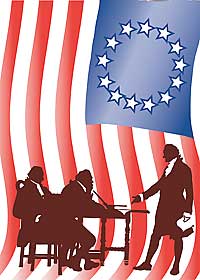
Blogging Domains For Sale
Bidding opens at: $100
Doughmain: http://www.BillofRightsBlog.com
Bidding will ensue in auction-fashion and will remain open until buyer & seller agree on a final price.Should you wish to make a "Buy Now" bid, please indicate in your email that your price is final.
Please email all bids/inquires to: blogdomains@gmail.com
In the United States, the Bill of Rights is the term for the first ten amendments to the United States Constitution. These amendments explicitly limit the Federal government's powers, protecting the rights of the people by preventing Congress from abridging freedom of speech, freedom of the press, freedom of assembly, freedom of religious worship, and the right to bear arms, preventing unreasonable search and seizure, cruel and unusual punishment, and self-incrimination, and guaranteeing due process of law and a speedy public trial with an impartial jury. In addition, the Bill of Rights states that "the enumeration in the Constitution, of certain rights, shall not be construed to deny or disparage others retained by the people,"[1] and reserves all powers not specifically granted to the Federal government to the citizenry or States. These amendments came into effect on December 15, 1791, when ratified by three-fourths of the States.
Initially drafted by James Madison in 1789, the Bill of Rights was written at a time when ideological conflict between Federalists and anti-Federalists, dating from the Philadelphia Convention in 1787, threatened the Constitution's ratification. The Bill was influenced by George Mason's 1776 Virginia Declaration of Rights, the 1689 English Bill of Rights, works of the Age of Enlightenment pertaining to natural rights, and earlier English political documents such as the Magna Carta (1215). The Bill was largely a response to the Constitution's influential opponents, including prominent Founding Fathers, who argued that it failed to protect the basic principles of human liberty.
The Bill of Rights plays a central role in American law and government, and remains a fundamental symbol of the freedoms and culture of the nation. One of the original fourteen copies of the Bill of Rights is on public display at the National Archives in Washington, DC.

No comments:
Post a Comment